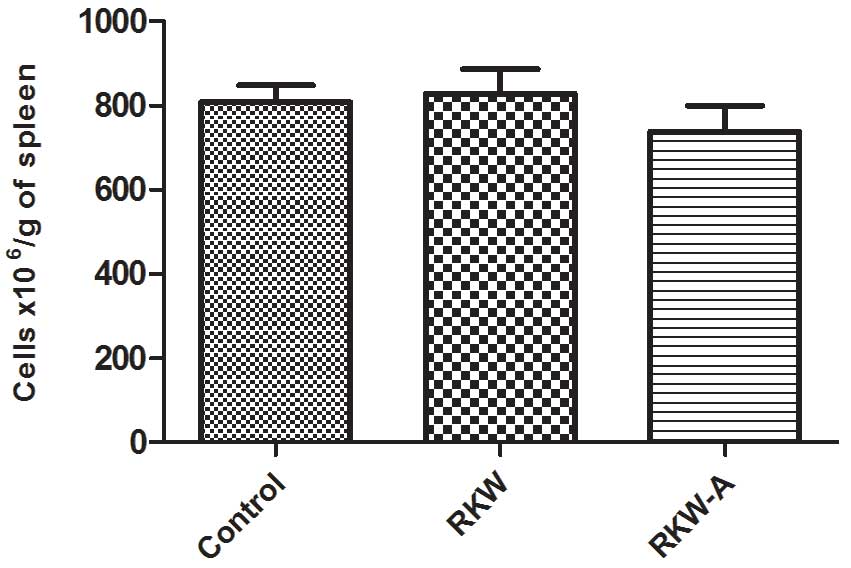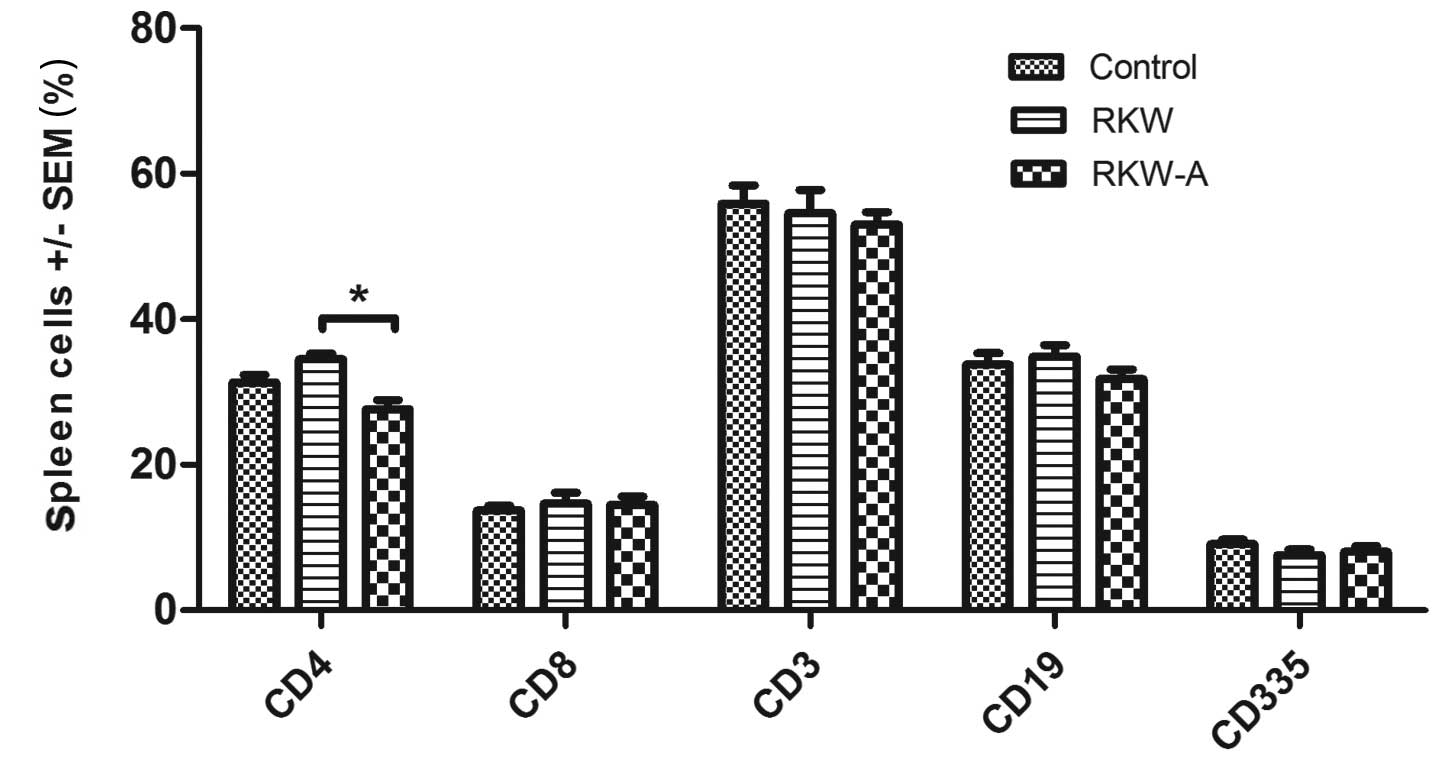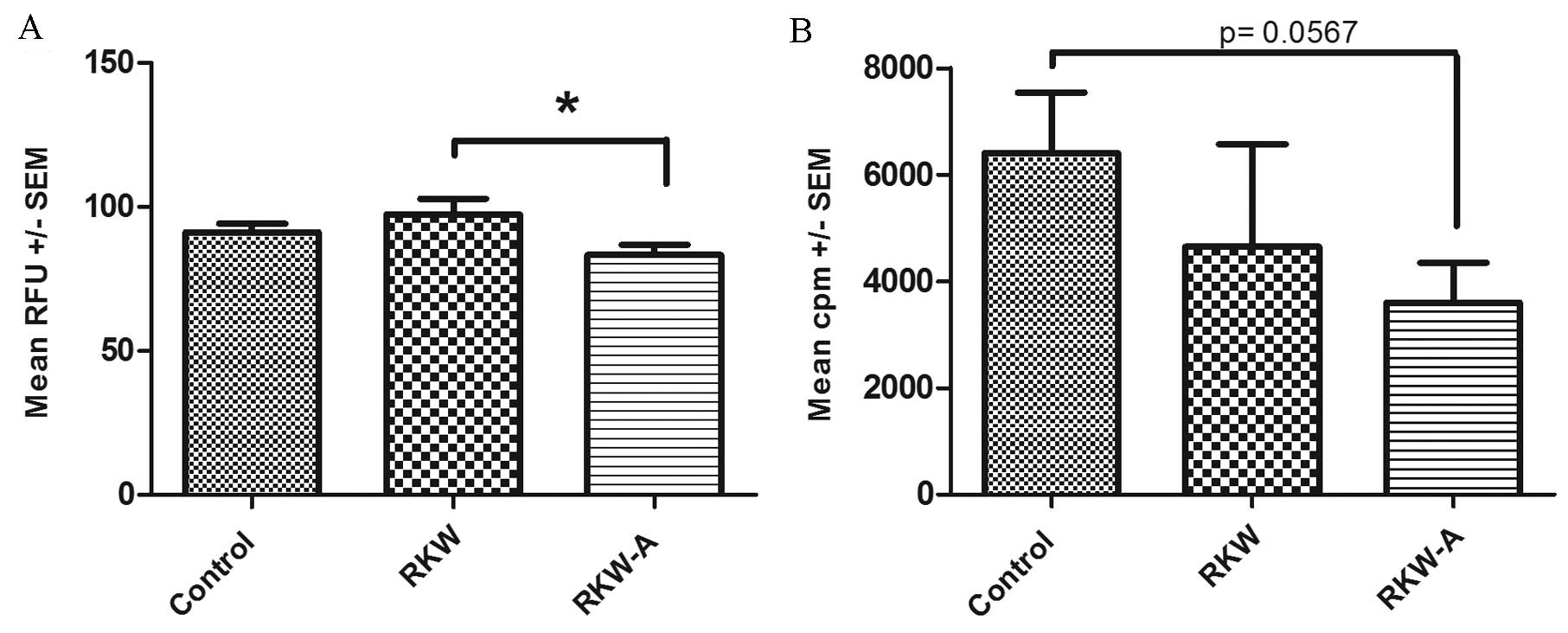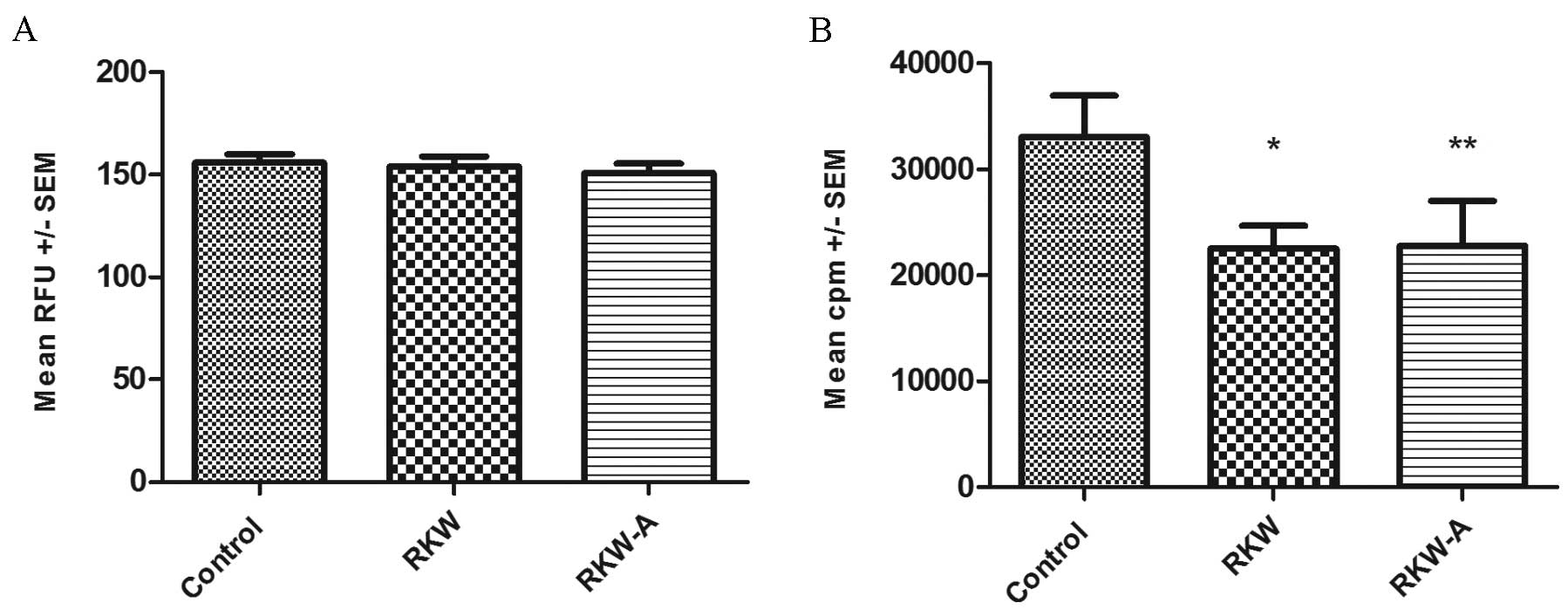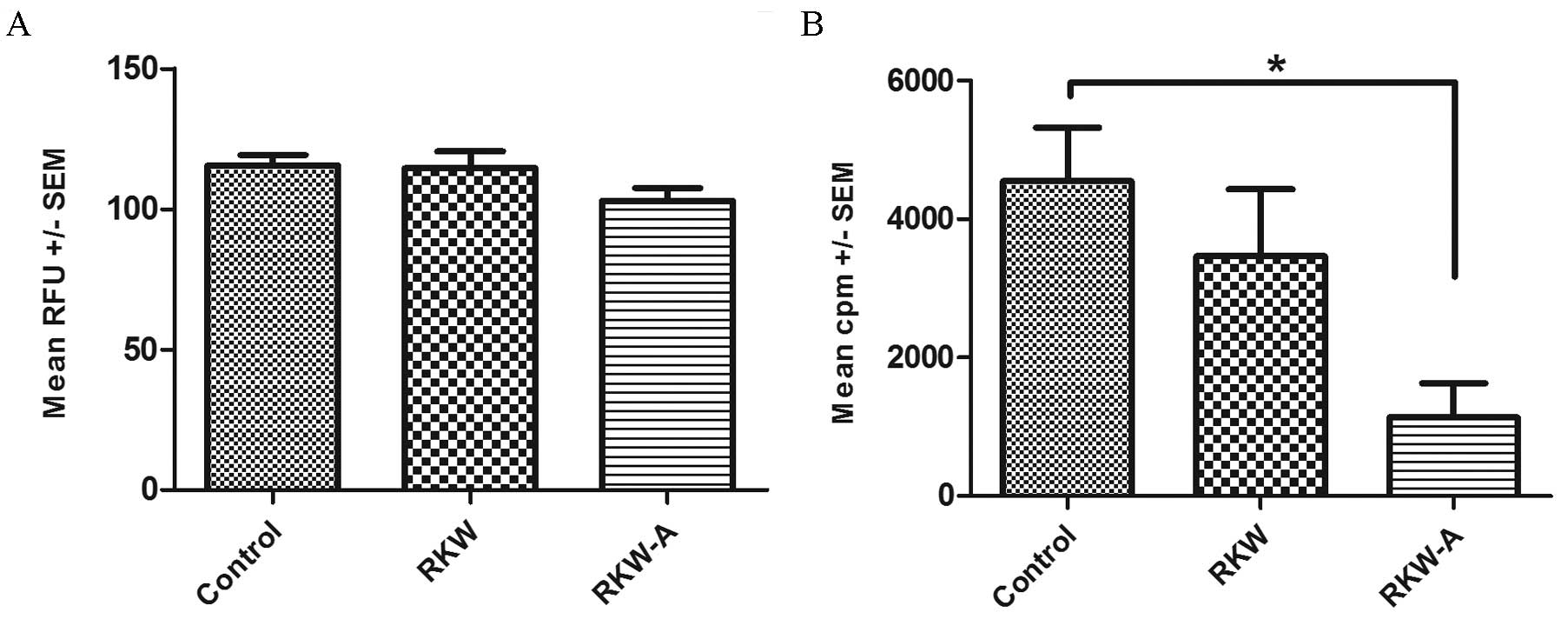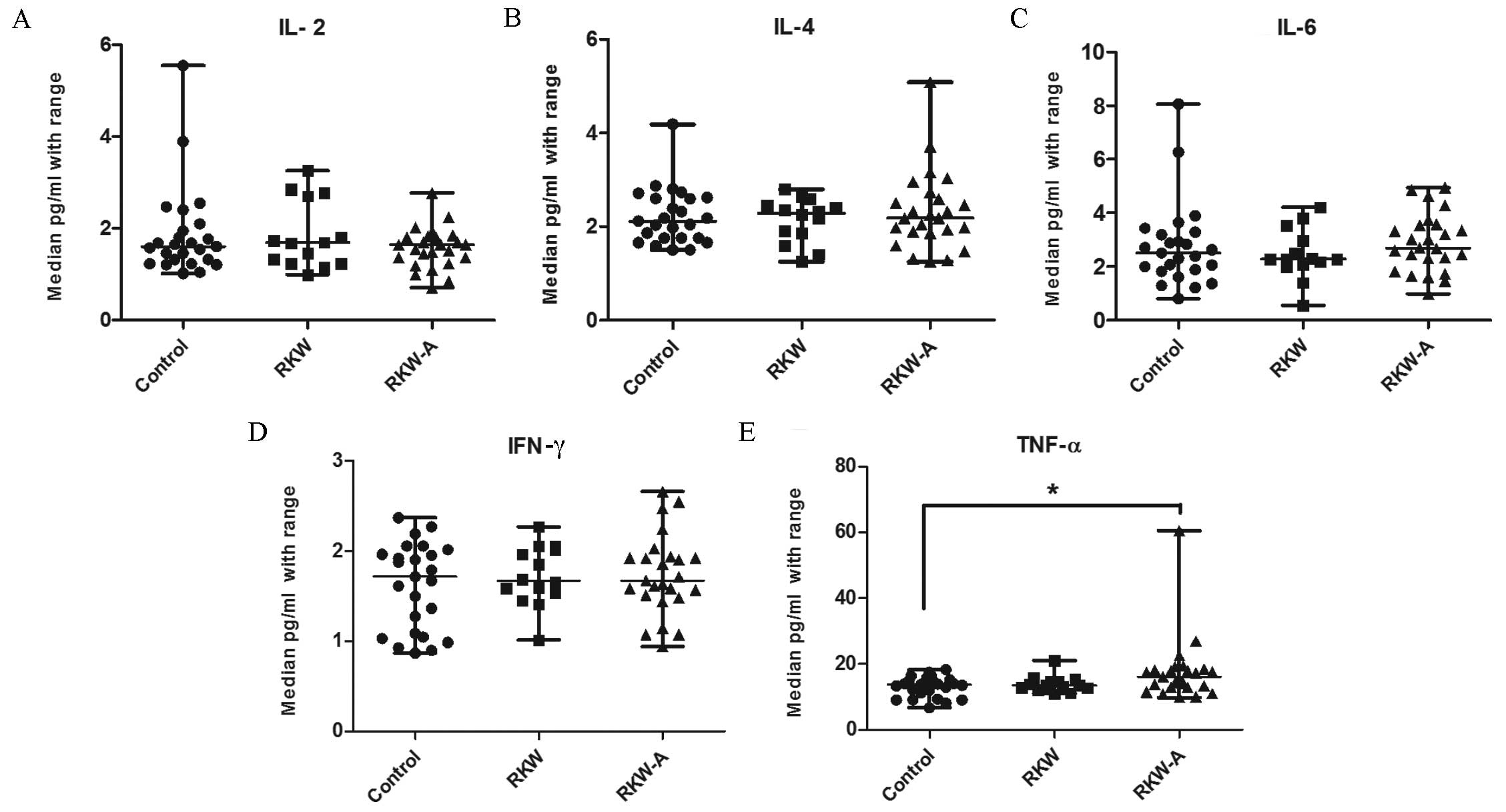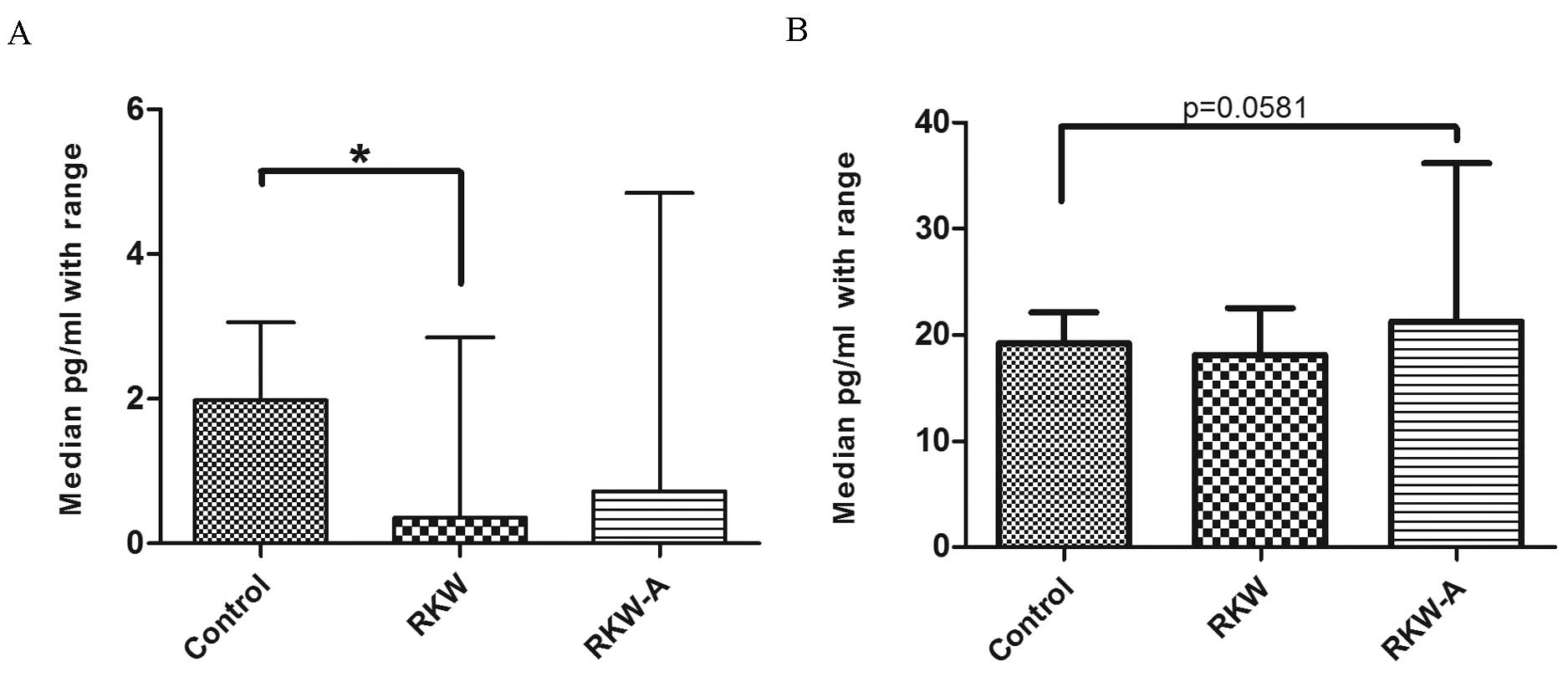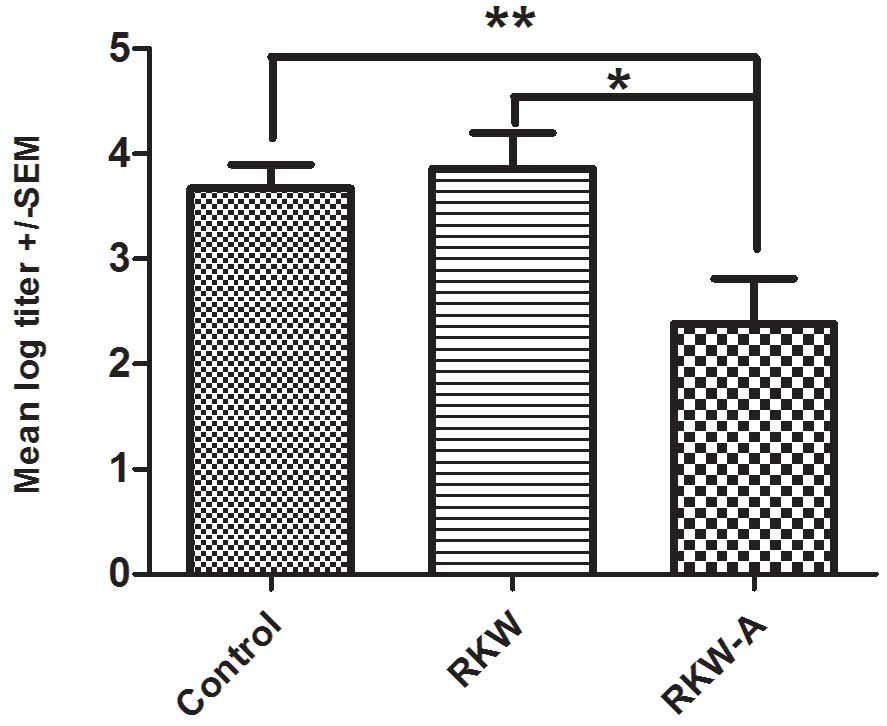|
1
|
Zhang S, Gao W, Xu K, Guo Y, Lin S, Xue X,
Lu G, Li N, Liu H and Liu W: Early use of Chinese drug rhodiola
compound for patients with post-trauma and inflammation in
prevention of ALI/ARDS. Zhonghua Wai Ke Za Zhi. 37:238–240.
1999.(In Chinese). PubMed/NCBI
|
|
2
|
Panossian A, Wikman G and Sarris J:
Rosenroot (Rhodiola rosea): Traditional use, chemical composition,
pharmacology and clinical efficacy. Phytomedicine. 17:481–493.
2010. View Article : Google Scholar : PubMed/NCBI
|
|
3
|
Hung SK, Perry R and Ernst E: The
effectiveness and efficacy of Rhodiola rosea L.: A systematic
review of randomized clinical trials. Phytomedicine. 18:235–244.
2011. View Article : Google Scholar : PubMed/NCBI
|
|
4
|
Mishra KP, Ganju L and Singh SB:
Anti-cellular and immunomodulatory potential of aqueous extract of
Rhodiola imbricata rhizome. Immunopharmacol Immunotoxicol.
34:513–518. 2012. View Article : Google Scholar : PubMed/NCBI
|
|
5
|
Chen SP, Liu R Huang, Lu TM, Wei JC, Wu
TC, Tsai WY, Tsai CH and Yang CC: Complementary usage of Rhodiola
crenulata (L.) in chronic obstructive pulmonary disease patients:
The effects on cytokines and T cells. Phytother Res. 29:518–525.
2015. View
Article : Google Scholar : PubMed/NCBI
|
|
6
|
Jeong HJ, Ryu YB, Park SJ, Kim JH, Kwon
HJ, Kim JH, Park KH, Rho MC and Lee WS: Neuraminidase inhibitory
activities of flavonols isolated from Rhodiola rosea roots and
their in vitro anti-influenza viral activities. Bioorg Med Chem.
17:6816–6823. 2009. View Article : Google Scholar : PubMed/NCBI
|
|
7
|
Diwaker D, Mishra KP, Ganju L and Singh
SB: Rhodiola inhibits dengue virus multiplication by inducing
innate immune response genes RIG-I, MDA5 and ISG in human
monocytes. Arch Virol. 159:1975–1986. 2014. View Article : Google Scholar : PubMed/NCBI
|
|
8
|
Ahmed M, Henson DA, Sanderson MC, Nieman
DC, Zubeldia JM and Shanely RA: Rhodiola rosea exerts antiviral
activity in athletes following a competitive marathon race. Front
Nutr. 2:242015. View Article : Google Scholar : PubMed/NCBI
|
|
9
|
Wang H, Ding Y, Zhou J, Sun X and Wang S:
The in vitro and in vivo antiviral effects of salidroside from
Rhodiola rosea L. against coxsackievirus B3. Phytomedicine.
16:146–155. 2009. View Article : Google Scholar : PubMed/NCBI
|
|
10
|
Cybulska P, Thakur SD, Foster BC, Scott
IM, Leduc RI, Arnason JT and Dillon JA: Extracts of Canadian first
nations medicinal plants, used as natural products, inhibit
neisseria gonorrhoeae isolates with different antibiotic resistance
profiles. Sex Transm Dis. 38:667–671. 2011. View Article : Google Scholar : PubMed/NCBI
|
|
11
|
Furmanowa M, Skopińska-Różewska E, Rogala
E and Hartwich M: Rhodiola rosea in vitro culture-phytochemical
analysis and antioxidant action. Acta Societ Botanic Pol. 67:69–73.
1998. View Article : Google Scholar
|
|
12
|
Siwicki AK, Skopińska-Różewska E, Hartwich
M, Wójcik R, Bakuła T, Furmanowa M, Bałan BJ, Sommer E, Mielcarek
S, Buchwald W, et al: The influence of Rhodiola rosea extracts on
non-specific and specific cellular immunity in pigs, rats and mice.
Centr Eur J Immunol. 32:84–91. 2007.
|
|
13
|
Skopińska-Różewska E, Wójcik R, Siwicki
AK, Sommer E, Wasiutyński A, Furmanowa M, Malinowski M and
Mazurkiewicz M: The effect of Rhodiola quadrifida extracts on
cellular immunity in mice and rats. Pol J Vet Sci. 11:105–111.
2008.PubMed/NCBI
|
|
14
|
Zdanowski R, Lewicki S, Sikorska K,
Żmigrodzka M, Buchwald W, Wilczak J and Skopińska-Różewska E: The
influence of aqueous and hydro-alcoholic extracts of roots and
rhizomes of Rhodiola kirilowii on the course of pregnancy in mice.
Centr Eur J Immunol. 39:471–475. 2014. View Article : Google Scholar
|
|
15
|
Lewicki S, Stankiewicz W,
Skopińska-Różewska E, Wilczak J, Leśniak M, Suska M, Siwicki AK,
Skopiński P and Zdanowski R: Spleen content of selected
polyphenols, splenocytes morphology and function in mice fed
Rhodiola kirilowii extracts during pregnancy and lactation. Pol J
Vet Sci. 18:847–855. 2015.PubMed/NCBI
|
|
16
|
Hertog MGL, Hollman PCH and Venema DP:
Optimization of a quantitative HPLC determination of potentially
anticarcinogenic flavonoids in vegetables and fruits. J Agric Food
Chem. 40:1591–1598. 1992. View Article : Google Scholar
|
|
17
|
Shin JW, Seol IC and Son CG:
Interpretation of animal dose and human equivalent dose for drug
development. J Korean Med. 31:1–7. 2010.
|
|
18
|
Zdanowski R, Stankiewicz W, Kamiński A,
Grzela T, Skopiński P, Lewicki S and Skopińska-Rózewska E: The
effect of sterilization by irradiation of human pericardium and
skin frozen tissues on their ability to influence the proliferation
of endothelial cells in vitro. Centr Eur J Immunol. 37:119–122.
2012.
|
|
19
|
Ahmed SA, Gogal RM Jr and Walsh JE: A new
rapid and simple non-radioactive assay to monitor and determine the
proliferation of lymphocytes: An alternative to [3H]thymidine
incorporation assay. J Immunol Methods. 170:211–224. 1994.
View Article : Google Scholar : PubMed/NCBI
|
|
20
|
Skopińska-Różewska E, Siwicki AK and
Sommer E: Stimulation of humoral immunity in mice by some
commercial fragrances. Centr Eur J Immunol. 34:232–234. 2009.
|
|
21
|
Alberts B, Johnson A, Lewis J, Raff M,
Roberts K and Walter P: Helper T cells and lymphocyte
activationMolecular biology of the Cell. 4th. New York: Garland
Science; 2002
|
|
22
|
Ferrari L, Martelli P, Saleri R, De
Angelis E, Cavalli V, Bresaola M, Benetti M and Borghetti P:
Lymphocyte activation as cytokine gene expression and secretion is
related to the porcine reproductive and respiratory syndrome virus
(PRRSV) isolate after in vitro homologous and heterologous recall
of peripheral blood mononuclear cells (PBMC) from pigs vaccinated
and exposed to natural infection. Vet Immunol Immunopathol.
151:193–206. 2013. View Article : Google Scholar : PubMed/NCBI
|
|
23
|
Bachmann MF and Oxenius A: Interleukin 2:
From immunostimulation to immunoregulation and back again. EMBO
Rep. 8:1142–1148. 2007. View Article : Google Scholar : PubMed/NCBI
|
|
24
|
Zhu J and Paul WE: Peripheral CD4+ T-cell
differentiation regulated by networks of cytokines and
transcription factors. Immunol Rev. 238:247–262. 2010. View Article : Google Scholar : PubMed/NCBI
|
|
25
|
Nishimoto N and Kishimoto T: Interleukin
6: From bench to bedside. Nat Clin Pract Rheumatol. 2:619–626.
2006. View Article : Google Scholar : PubMed/NCBI
|
|
26
|
Riether C, Schürch CM and Ochsenbein AF:
Regulation of hematopoietic and leukemic stem cells by the immune
system. Cell Death Differ. 22:187–198. 2015. View Article : Google Scholar : PubMed/NCBI
|
|
27
|
Zhou X, Schmidtke P, Zepp F and Meyer CU:
Boosting interleukin-10 production: Therapeutic effects and
mechanisms. Curr Drug Targets Immune Endocr Metabol Disord.
5:465–475. 2005. View Article : Google Scholar : PubMed/NCBI
|
|
28
|
Shevach EM, DiPaolo RA, Andersson J, Zhao
DM, Stephens GL and Thornton AM: The lifestyle of naturally
occurring CD4+ CD25+ Foxp3+ regulatory T cells. Immunol Rev.
212:60–73. 2006. View Article : Google Scholar : PubMed/NCBI
|
|
29
|
Ouyang W, Kolls JK and Zheng Y: The
biological functions of T helper 17 cell effector cytokines in
inflammation. Immunity. 28:454–467. 2008. View Article : Google Scholar : PubMed/NCBI
|
|
30
|
Onishi RM and Gaffen SL: Interleukin-17
and its target genes: Mechanisms of interleukin-17 function in
disease. Immunology. 129:311–321. 2010. View Article : Google Scholar : PubMed/NCBI
|
|
31
|
Yi T, Zhao D, Lin CL, Zhang C, Chen Y,
Todorov I, LeBon T, Kandeel F, Forman S and Zeng D: Absence of
donor Th17 leads to augmented Th1 differentiation and exacerbated
acute graft-versus-host disease. Blood. 112:2101–2110. 2008.
View Article : Google Scholar : PubMed/NCBI
|
|
32
|
Khanum F, Bawa AS and Singh B: Rhodiola
rosea: A Versatile Adaptogen. Compr Rev Food Sci F. 4:55–62. 2005.
View Article : Google Scholar
|
|
33
|
Brown RP and Gerbarg PL: Rhodiola rosea: A
Phytomedicinal Overview. HerbalGram. 56:2002.
|
|
34
|
Skopińska-Rózewska E, Stankiewicz W,
Zdanowski R, Siwicki AK, Furmanowa M, Buchwald W and Wasiutyński A:
The in vivo effect of Rhodiola quadrifida extracts on the antibody
production, on the blood leukocytes subpopulations and on the
bacterial infection in mice. Centr Eur J Immunol. 37:140–144.
2012.
|
|
35
|
Mishra KP, Chanda S, Shukla K and Ganju L:
Adjuvant effect of aqueous extract of Rhodiola imbricata rhizome on
the immune responses to tetanus toxoid and ovalbumin in rats.
Immunopharmacol Immunotoxicol. 32:141–146. 2010. View Article : Google Scholar : PubMed/NCBI
|
|
36
|
Bień K, Lewicki S, Zdanowski R,
Skopińska-Różewska E and Krzyżowska M: Feeding pregnant and
lactating mice Rhodiola kirilowii extracts helps to preserve thymus
function of their adult progeny. Pol J Vet Sci. 19:581–587.
2016.
|















